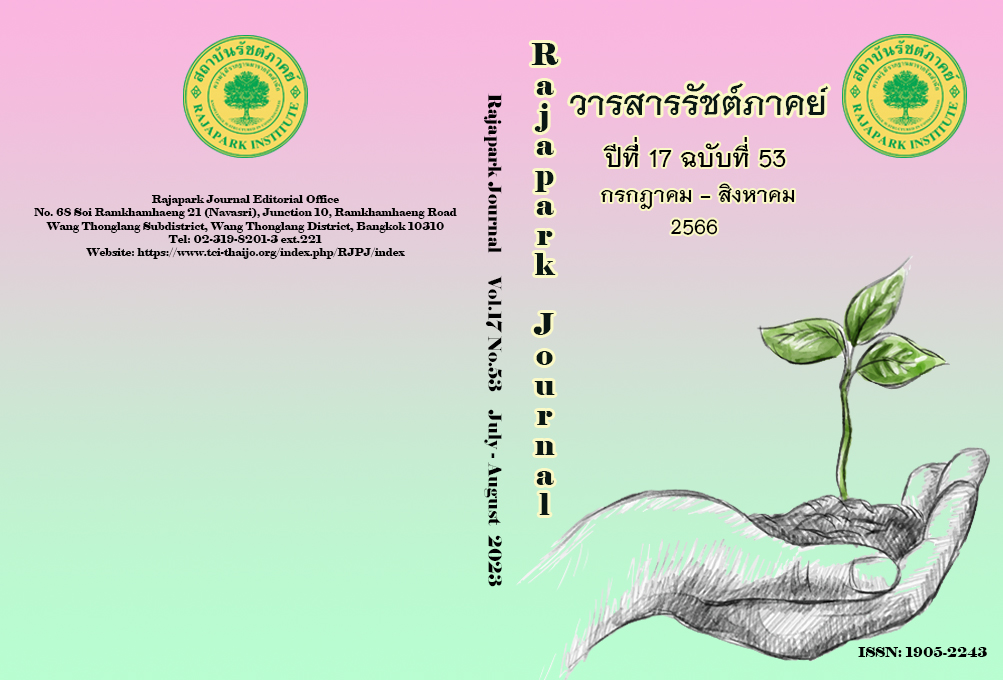The Legal Problems in Real-Estate Compensation Determination According to Expropriation and Acquisition of Immovable Property Act, B.E. 2562 (2019)
Main Article Content
Abstract
This research aims to, first, analyze the rules of compensation determination for expropriated immovable properties under the Expropriation and Acquisition of Immovable Property Act, B.E. 2562 (A.D. 2019), including lands, perennial plants and their products, and non-expropriated realties that are affected by the expropriation, and second, provide some suggestions to those rules. The method of this research focuses on the documents, summarization of every piece of information related to the compensation determination, and comparing the foreign cases to the domestic cases, in which the current Thai law doesn't cover the damages from the expropriation. This research finds that the cost to compensate for the damages from expropriation, which is being done by the government agency, must be appropriate and adequate to reinstate that property back to its former state. However, Thai government agencies don't have any discretionary rules to determine the compensation for the lands, the immovable properties on the expropriated lands, and other benefits that are lost by the process of expropriation. That leads to several cases of inadequate and unjust compensation.
Article Details

This work is licensed under a Creative Commons Attribution-NonCommercial-NoDerivatives 4.0 International License.
Views and opinions appearing in the Journal it is the responsibility of the author of the article, and does not constitute the view and responsibility of the editorial team.
References
Baum, A., Sams, G., Ellis, J., Hampson, C., & Stevens, D. (2014). Statutory Valuation (4th ed.). Estates Gazette.
Boramanand, N. (2017). Administrative Law (5th ed.). Winyuchon.
Khumyoung, N. (2007). Just Compensation According to Expropriation Law[Master’s Thesis, Thammasat. University].
Koosuwan, S. (1997). The Legality of Expropriation Regarding Thai Legal System[Master’s Thesis, Thammasat. University].
Mamout, A. (2021). Property Law (4th ed.). Thammasat University.
Pakeerat, V. (2011). Administrative Law. Nitirath.
Pakeerat, V. (2012). Administrative Law Comparing State Liability in the German, French, and British Legal Systems. Thammasat University.
Pakeerat, V. (2012). State and Public Law (2nd ed.). Winyuchon.
Sansira, W. (2011). Legal Reflection, Immovable Property Expropriation. Junniti Journal, 8(2), 153-162. http://web.senate.go.th/lawdatacenter/includes/FCKeditor/upload/Image/b/Legal/legal20.pdf
Seungsil, P. (1995). Principles of Property Valuation (2nd ed.). Suthasil.
Suriyachotichayangkul, J., & Unahakate, I. (2019). Analysis of the Laws Currently in Effect on the Immovable Property Expropriation Act B.E. 2530: A Complete Report. King Prajadhipok's Institute.
Tunprawat, P. (2004). Guides to the Establishment of Appropriate Compensation for the Expropriation of Immovable Properties[Master’s Thesis, Chulalongkorn University].
Wisarutphit, W. (1989). Control of Administrative Discretion by the Judiciary. Administrative Law Journal, 8, 33.


